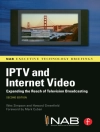Distributed Cooperative Laboratories: Networking, Instrumentation, and Measurements is devoted to the investigation of the main issues related to the sustainable realization of tele-laboratories, where real and virtual instrumentation can be shared and used in a collaborative environment. This is a highly interdisciplinary topic, where various aspects converge: multimedia communications and networking, sensor networks, Grid technology, Quality of Service (Qo S) provisioning and control, network management, measurement instrumentation and methodology, architecture of measurement systems. The book contains peer reviewed chapters organized into six parts: Technologies for Real-Time Interactive Multimedia Communications; Monitoring, Management and Configuration of Networks and Networking Devices; Data Acquisition and Aggregation in Sensor Networks; Grid Structures for Distributed Cooperative Laboratories; Architectures and Techniques for Tele-Measurements; and Virtual Immersive Communications and Distance Learning. Each chapter presents a self-contained treatment, within a framework that provides the reader with an up-to-date picture of the state-of-the-art and of the most recent developments of this multi-faceted topic.
Jadual kandungan
Technologies For Real-Time Interactive Multimedia Communications.- Team Collaboration Mixing Immersive Video Conferencing With Shared Virtual 3D Objects.- On The Stochastic Scalability Of Information Sharing Platforms.- A Multimedia Adaptive-Quality Platform For Real-Time E-Learning Over IP.- Real-Time Applications In 803.11 WLAN Using Feedback-Based Bandwidth Allocation.- Audio Rendering System For Multimedia Applications.- Qo S Provisionig And Control In Real-Time Interactive Multimedia Communications Using Digital Watermarking.- Monitoring, Management and Configuration of Networks and Networking Devices.- A Critical View Of The Sensitivity Of Transit ASs To Internal Failures.- The Co Mo Project: Towards A Community-Oriented Measurement Infrastructure.- TCP Anomalies: Identification And Analysis.- A High Performance IP Traffic Generation Tool Based On The Intel IXP2400 Network Processor.- IP Forwarding Performance Analysis In The Presence Of Control Plane Functionalities In A PC-Based Open Router.- Data Acquisition And Aggregation In Sensor Networks.- On Data Acquisition And Field Reconstruction In Wireless Sensor Networks.- Cost Efficient Localized Geographical Forwarding Strategies For Wireless Sensor Networks.- Semi-Probabilistic Routing For Highly Dynamic Networks.- S-Wi Ne Test: Remote Access To A Sensor Testbed.- Decentralized Detection In Sensor Networks With Noisy Communication Links.- GRID Structures For Distributed Cooperative Laboratories.- Real Time Streaming Data Grid Applications.- The GRIDCC Project.- Collaborative Environments For The GRID: The GRIDCC Multipurpose Collaborative Environment.- Design And Development Of A GNRB For The Coordinated Use Of Network Resources In A High Performance Grid Environment.- A P2P Framework For Distributed And Cooperative Laboratories.- Exposing Measurement Instruments As Grid Services.- Distributed Information Retrieval In GRID Environment: A Formal Approach.- Architectures And Techniques For Tele-Measurements.- Architectures For Remote Measurement.- Traceability Assurance Of Tele-Measurements.- Exploring The Capabilities Of Web-Based Measurement Systems For Distance Learning.- A WEB-Based Architecture Enabling Cooperative Telemeasurements.- The MOME Workstation As A Platform For Automatic Analysis Of Measurement Data.- LATERE: A Remote-Access Laboratory For Experiences On Management And Control Of Networking Devices.- The LABNET-Server Software Architecture For Remote Management Of Distributed Laboratories: Current Status And Perspectives.- A New Perspective In Instrumentation Interfaces As Web Services.- Virtual Immersive Communications And Distance Learning.- Architectures For Context Aware Services.- The Teledoc2 Project: A Heterogeneous Infrastructure For International E-Learning.- The Dynamic Construction Of Multi-User VRML 3D Environment For Immersive Learning On The Web.- Ne BULa (Network-Based User-Location Sensing System): A Novel And Open Location Sensing Framework Operating On A WLAN Environment.- The VIL (Virtual Immersive Learning) Test-Bed: An Innovative Approach To Distance Learning.












